Day 1 Wrap-Up: SIEW 2024 Kicks Off with Calls for Stronger Collaboration
Singapore International Energy Week (SIEW) 2024 opens by setting a strong tone for a connected and sustainable energy future. Deputy Prime Minister and Minister for Trade and Industry Gan Kim Yong delivered the Singapore Energy Lecture, outlining how Singapore is accelerating the current pace of decarbonisation.
.jpg?sfvrsn=b775ef79_1)
Here's a recap of Day 1's key announcements and highlights:
How is your SIEW 2024 experience thus far? Share your thoughts with us by taking a quick survey!
Follow us on X (formerly Twitter) and Telegram to get the latest updates.
Read more
Stay tuned as the conversation evolves throughout the day. Follow @SIEW_sg on Telegram and Twitter for key insights, as we navigate Day 1 together.
Collaborative Decarbonisation and Innovative Financing for Energy Transition Projects
Contributed by Alika Koh, EMA
During the SIEW Summit panel discussion on "Financial Innovation for a Resilient Energy Future", industry leaders discussed collaborative decarbonisation strategies and innovative financing solutions, emphasising tailored approaches and carbon pricing.
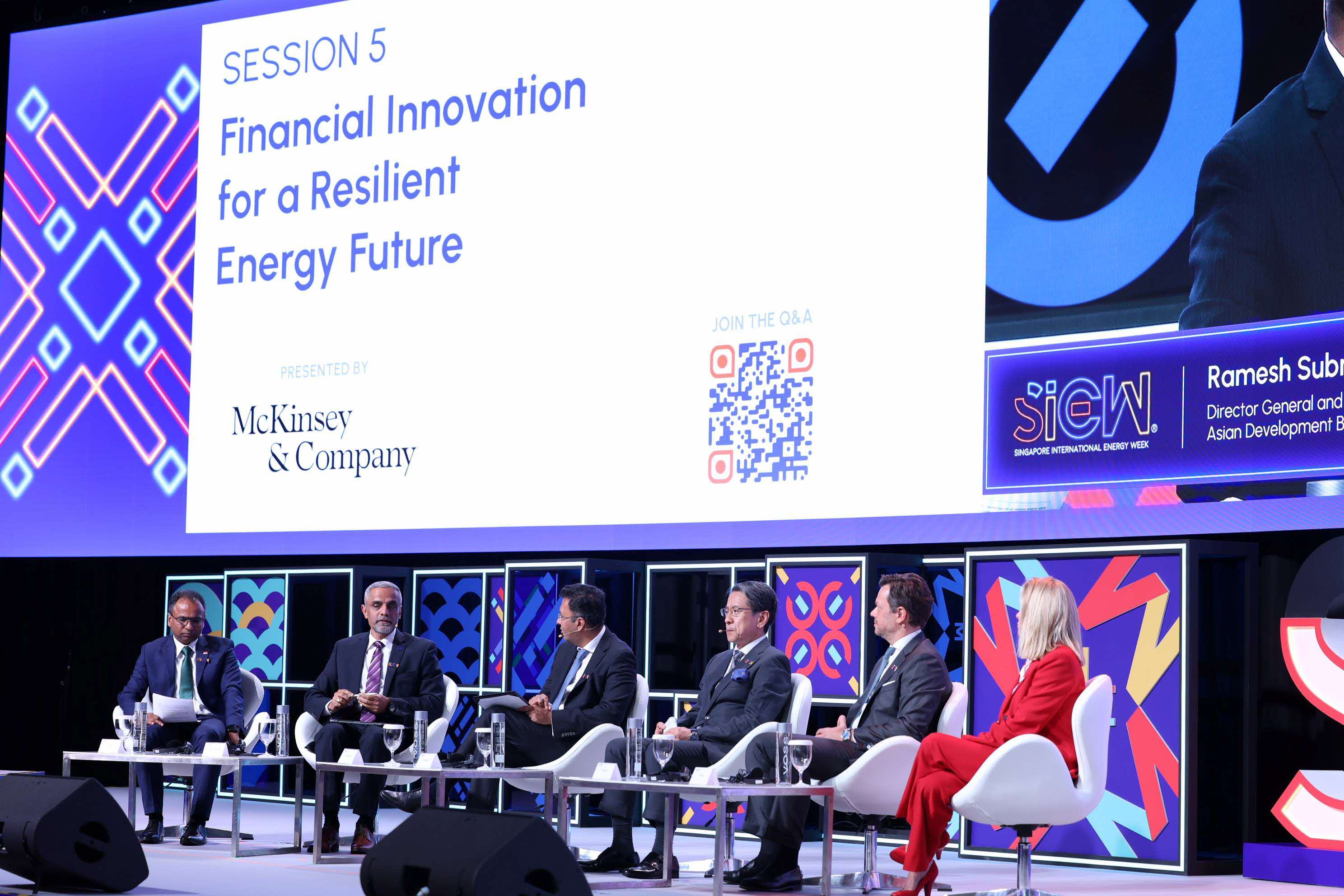
Sharing their insights were Mr Maeda Tadashi, Managing Director, Chairman of the Board of Directors, Japan Bank for International Cooperation (JBIC); Mr Lavan Thiru, Executive Director, Infrastructure Asia; Dr Sama Bilbao y León, Director General, World Nuclear Association; Mr Ramesh Subramaniam, Director General and Group Chief Sectors Group, Asian Development Bank; and Mr Luca Tonello, MD and Chair of Energy and Infrastructure Asia Pacific, SMBC.
- Regional cooperation and knowledge exchange are vital for overcoming decarbonisation challenges. No single country can achieve this alone.
- Blended finance and new financial instruments can help de-risk projects, making them more attractive to private investors. This is critical to drive the net zero transition.
- Effective carbon pricing and emissions trading schemes are key to mobilising investment in low carbon energy infrastructure. This will provide the financial certainty needed for successful transitions.
- Developing local manufacturing capabilities and improving cross-border connectivity will enhance resource utilisation, making renewable energy projects more viable and affordable.
Read More
Stay tuned as the conversation evolves throughout the day. Follow @SIEW_sg on Telegram and Twitter for key insights, as we navigate Day 1 together.
Going “All-In”: Inclusivity plays a crucial role in sustainable energy transition
Contributed by Jason Leong Ka-Sing, National University of Singapore
Speakers at the SIEW Summit Closing Session, on "Powering All: Harnessing Inclusiveness for Sustainable Progress", explored how inclusivity is key to ensuring a successful and sustainable energy transition. They were Mr Fahad K. Al Dhubaib, Senior Vice President for Strategy & Market Analysis, Aramco; Mr Tatsuya Terazawa, Chairman and Chief Executive Officer, Institute of Energy Economics, Japan; Dr Angela Wilkinson, Secretary General and Chief Executive Officer, World Energy Council; and Mr Joseph McMonigle, Secretary General, International Energy Forum.
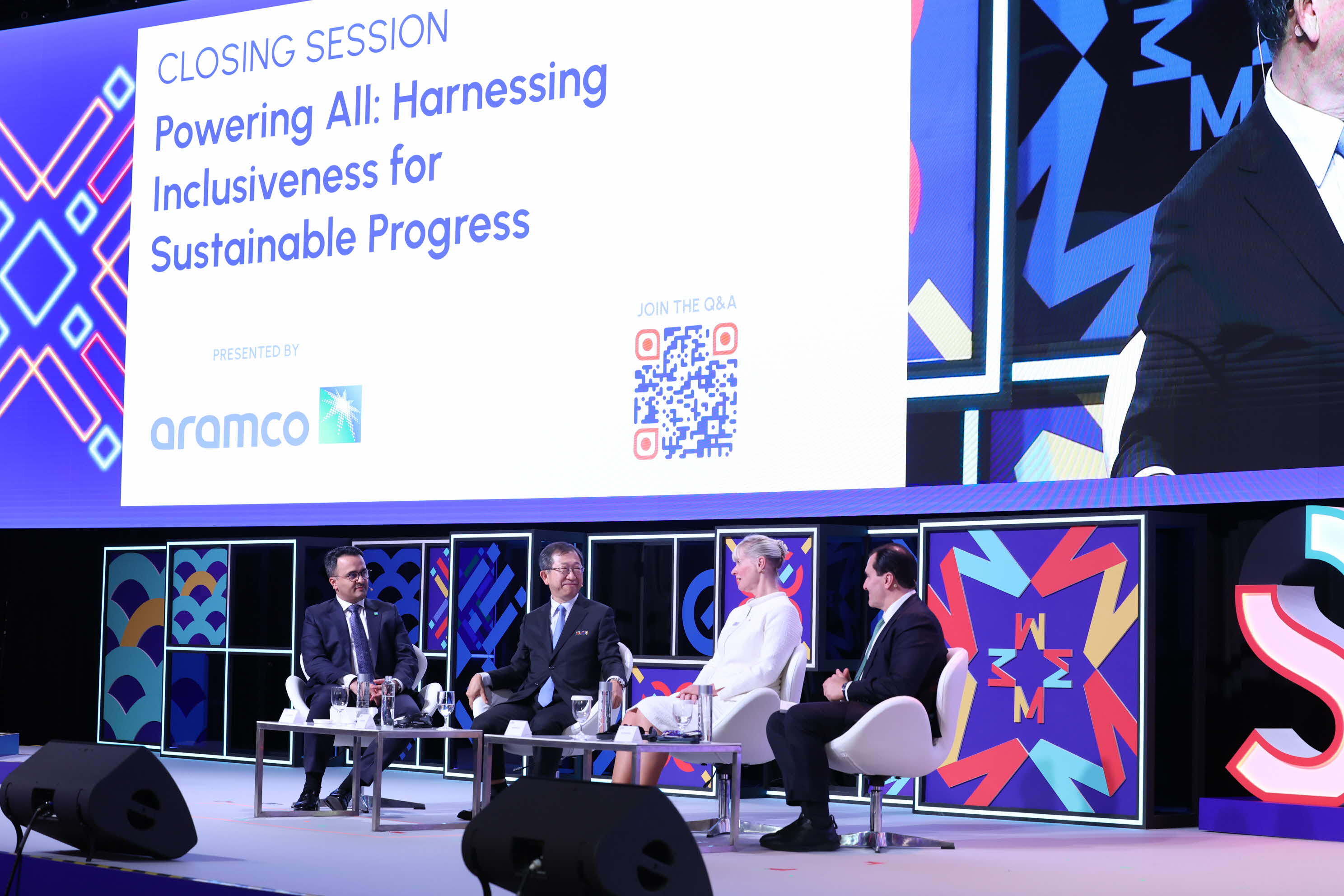
- Inclusivity plays a vital role in making sustainable energy accessible to all. Broadening energy access, especially for underserved regions, and addressing energy poverty are essential steps for progress.
- To enhance inclusivity, there must be support for emerging energy technologies, adaptive market frameworks focused on emissions, and realistic views and discussions about energy transition challenges.
- True inclusivity involves directly engaging stakeholders, particularly women, younger generations, and voices from the Global South. This will ensure a diverse and comprehensive dialogue on energy solutions.
- The role of traditional energy sectors, including OPEC and oil & gas companies, is increasingly recognised globally, where once they were stigmatised. They are necessary for a holistic perspective involving not just sustainability, but also affordability and accessibility of energy.
Read more
Stay tuned as the conversation evolves throughout the day. Follow @SIEW_sg on Telegram and Twitter for key insights, as we navigate Day 1 together.
Balancing Renewables and Conventional Fuels for a Sustainable Energy Transition
At the SIEW Summit Spotlight Session on "Transition to a Greener Future: The Interplay of Renewables and Natural Gas", panelists explored the need to integrate both renewable and conventional fuels to ensure a stable and just energy transition.
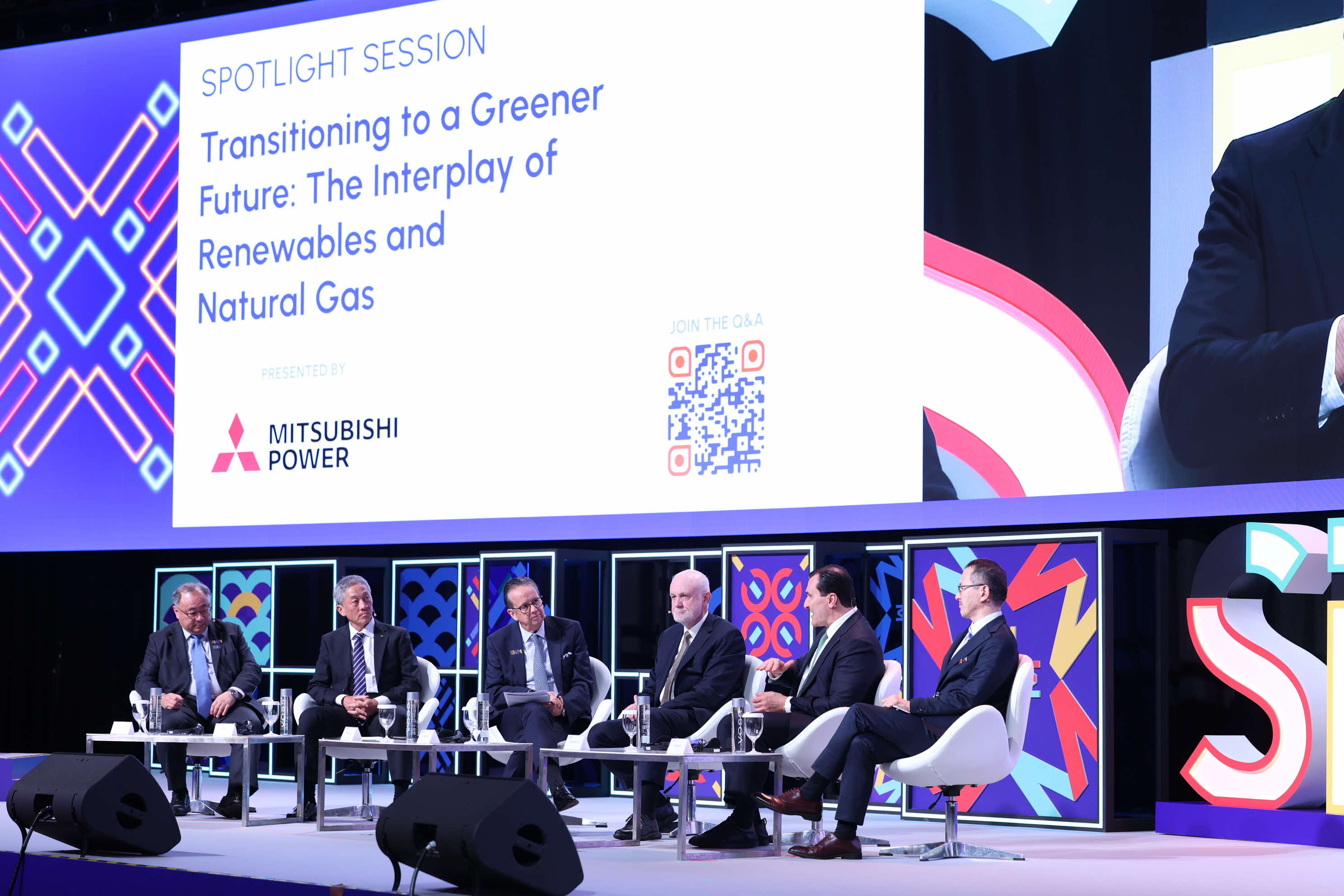
Offering diverse perspectives were Mr Mark Christie, Commissioner, United States Federal Energy Regulatory Commission (FERC); Mr Masanori Tsuruda, Deputy Commissioner For International Affairs, Agency For Natural Resources And Energy, Ministry Of Economy, Trade And Industry, Japan; Mr Joseph McMonigle, Secretary General, International Energy Forum; Mr Takao Tsukui, Executive Vice President, Mitsubishi Power; and Mr Leong Wei Hung, Chief Executive Officer, Singapore LNG Corporation.
- A balanced approach is essential for the energy transition, requiring continued investment in both renewables and conventional energy sources like natural gas. This balance is crucial for maintaining energy stability, avoiding market volatility, and keeping energy prices affordable—especially in light of current economic challenges.
- ASEAN countries are adopting a "triple breakthrough" strategy, aiming to simultaneously achieve emissions reduction, economic growth, and energy security. This tailored approach underscores the importance of considering regional contexts and socio-economic factors in energy policy, particularly to sustain public support for the transition.
- The increasing electrification of the world, driven by growing demand from electric vehicles and data centres, presents new challenges. Grid stability must be maintained by leveraging "dispatchable resources" such as natural gas, nuclear energy, and coal. This is especially when weather-dependent renewables aren't able to meet demand.
Read more
Stay tuned as the conversation evolves throughout the day. Follow @SIEW_sg on Telegram and Twitter for key insights, as we navigate Day 1 together.
400 Million Tonnes: Is the World Ready for Hydrogen and Ammonia?
Contributed by Danish Mirza, Singapore University of Social Sciences
With 400 million tonnes of clean hydrogen required to meet net zero targets, the potential for hydrogen and ammonia to drive the low carbon transition was front and centre at SIEW Summit Session 4's "Hydrogen and Ammonia: Catalysts for a Low Carbon Energy Transition".
Exploring these fuels as catalysts for change were H.E. Dr Ahmed Mohina, First Undersecretary of Strategic Planning, Ministry of Electricity and Renewable Energy, Egypt; H.E. Richard Lochhead, Minister for Business, Scottish Government; Mr Raymond Poon, Director, Electrical and Mechanical Services Department, Hong Kong SAR, China; Mr Dick Richelle, Chairman of the Executive Board and Group Chief Executive Officer, Royal Vopak; Mr Ravi Balasubramanian, Managing Director, Portfolio Development Group, Managing Director, Investment Group, New Energy and Industrials, Temasek; and Ms Meg O’Neill, Chief Executive Officer and Managing Director, Woodside Energy.
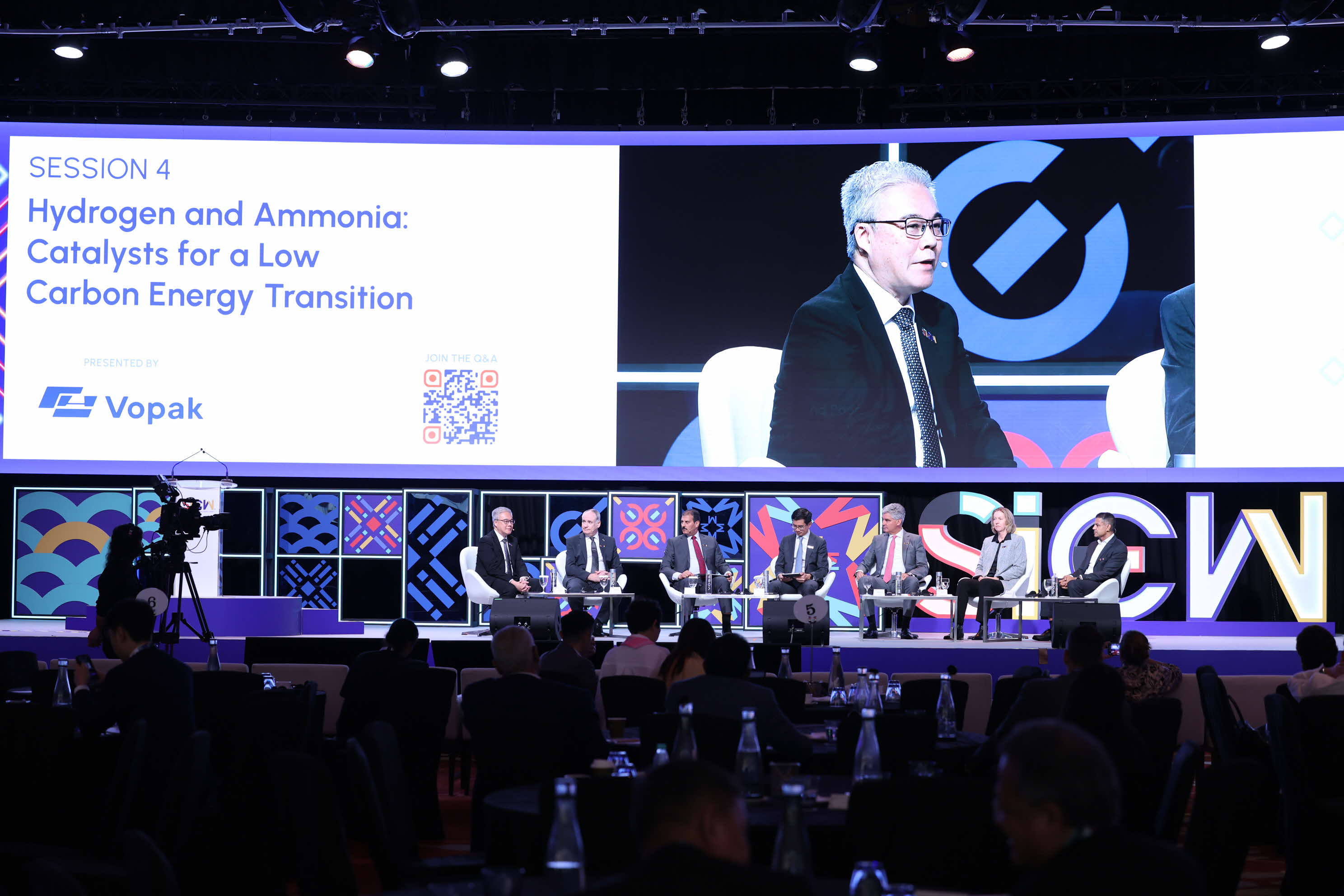
- Panellists noted the slow progress of investment in clean hydrogen due to high costs and limited demand, underscoring the need for stronger financial support.
- Government representatives outlined key strategies for advancing hydrogen and ammonia initiatives. They emphasised the importance of international collaboration to accelerate progress.
- Company representatives highlighted the need for the right policies and a level playing field for low carbon products. They also called for government incentives and mandates to drive demand for hydrogen and ammonia.
- A proper ecosystem of partnerships is essential to scale up low carbon projects, attracting capital, and making projects like hydrogen and ammonia commercially viable.
- While the panel agreed that hydrogen and ammonia hold strong potential as future export commodities, they acknowledged current market limitations that must be overcome to unlock their full potential.
Read more
Stay tuned as the conversation evolves throughout the day. Follow @SIEW_sg on Telegram and Twitter for key insights, as we navigate Day 1 together.
Government Intervention Key to Fostering a Connected and Sustainable Energy Future in Asia
Contributed by Lee Mian Rong & Amelia Liong, EMA
Panellists at the Singapore Summit Session 1 discussed the progress of Asia's energy transition. They highlighted what it would take to accelerate the region's journey to sustainability.

- While investment in clean energy has increased, more collaboration is required to make clean energy projects more attractive and beneficial for all stakeholders.
- Unified effort is critical to accelerate large-scale energy infrastructure, said the panellists at SIEW Summit Session 1. They were H.E. Tse Chin-Wan, Secretary for Environment and Ecology, Hong Kong SAR, China; Mr Francesco La Camera, Director-General, International Renewable Energy Agency (IRENA); Mr Pang Xiaogang, President, State Grid Corporation of China; Mr Wong Kim Yin, Group President and Chief Executive Officer, Sembcorp Industries; and Mr Lim Wee Seng, Group Head of Energy, Renewables and Infrastructure, DBS Bank.
- Though Asia has achieved record renewable energy installations, the speed and scale of implementation still fall short of regional targets. Current capacity is less than half of what is needed to meet ambitious energy goals.
- Both virtual grid connection and physical grid infrastructure are essential to Asia's energy future. While physical infrastructure will take years to implement fully, virtual connections are just as crucial in enabling cross-border energy flows.
- Asia has seen the results of positive actions. However, there is still room for improvement in technology sharing and funding collaboration across the region. Closing these gaps is essential to supporting the next phase of Asia's energy transition.
- To accelerate collaboration, three critical elements were emphasised: political will, an industry mindset, and the availability of exchange platforms. These factors are crucial for overcoming challenges and fostering a connected and sustainable energy future in Asia.
Read more
Stay tuned as the conversation evolves throughout the day. Follow @SIEW_sg on Telegram and Twitter for key insights, as we navigate Day 1 together.
Strengthening Regional Energy Connectivity for Asia's Sustainable Future
During SIEW Summit Session 3, on "Energising Regions: Advancing Regional Energy Interconnectivity", energy leaders discussed strategies to advance greater regional energy interconnectivity. On the panel were H.E. Csaba Lantos, Minister of Energy, Hungary; H.E. Dr Andrew Light, Assistant Secretary of International Affairs, Department of Energy, US; Mr Xin Baoan, Chairman, Global Energy Interconnection Development and Cooperation Organisation; Mr Thorbjörn Fors, Group Senior Vice President, Managing Director of Asia Pacific, Siemens Energy; and Mr Ong Teng Koon, Managing Director, SP PowerInterconnect, SP Group.
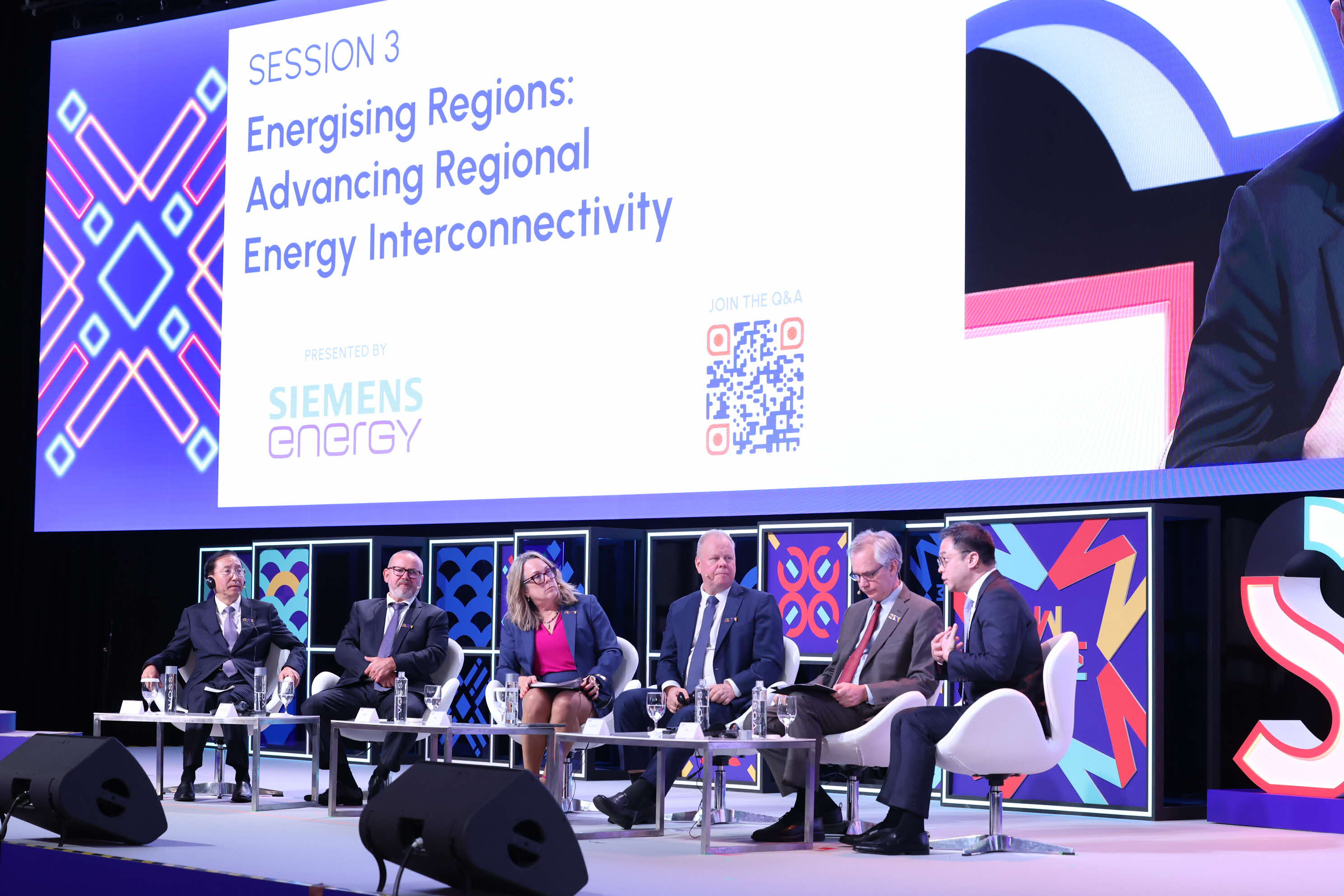
- The panellists highlighted the Nordic electricity exchange in Europe as an example of balancing diverse energy sources such as hydro and wind energy across countries. Hungary's use of interconnectors with its neighbours helped manage supply fluctuations, while SP Power Interconnect highlighted the critical role of infrastructure and protocols in supporting interconnected projects.
- Speakers underscored the need for common standards, fair markets, and transparency in cross-border projects, stressing the importance of streamlined permitting and licensing processes to foster energy interconnectivity.
- Panellists emphasised that energy interconnection is crucial for ensuring energy security in Asia, A step-by-step approach was recommended to avoid delays. The potential role of natural gas during the energy transition was also highlighted.
Read more
Stay tuned as the conversation evolves throughout the day. Follow @SIEW_sg on Telegram and Twitter for key insights, as we navigate Day 1 together.
Building Coalitions to Drive the Energy Transition
In his Keynote during the Singapore Energy Summit, Mr Bas Verkooijen, CEO of Advario, called for "coalitions of the willing" to drive sustainable progress on a global scale.
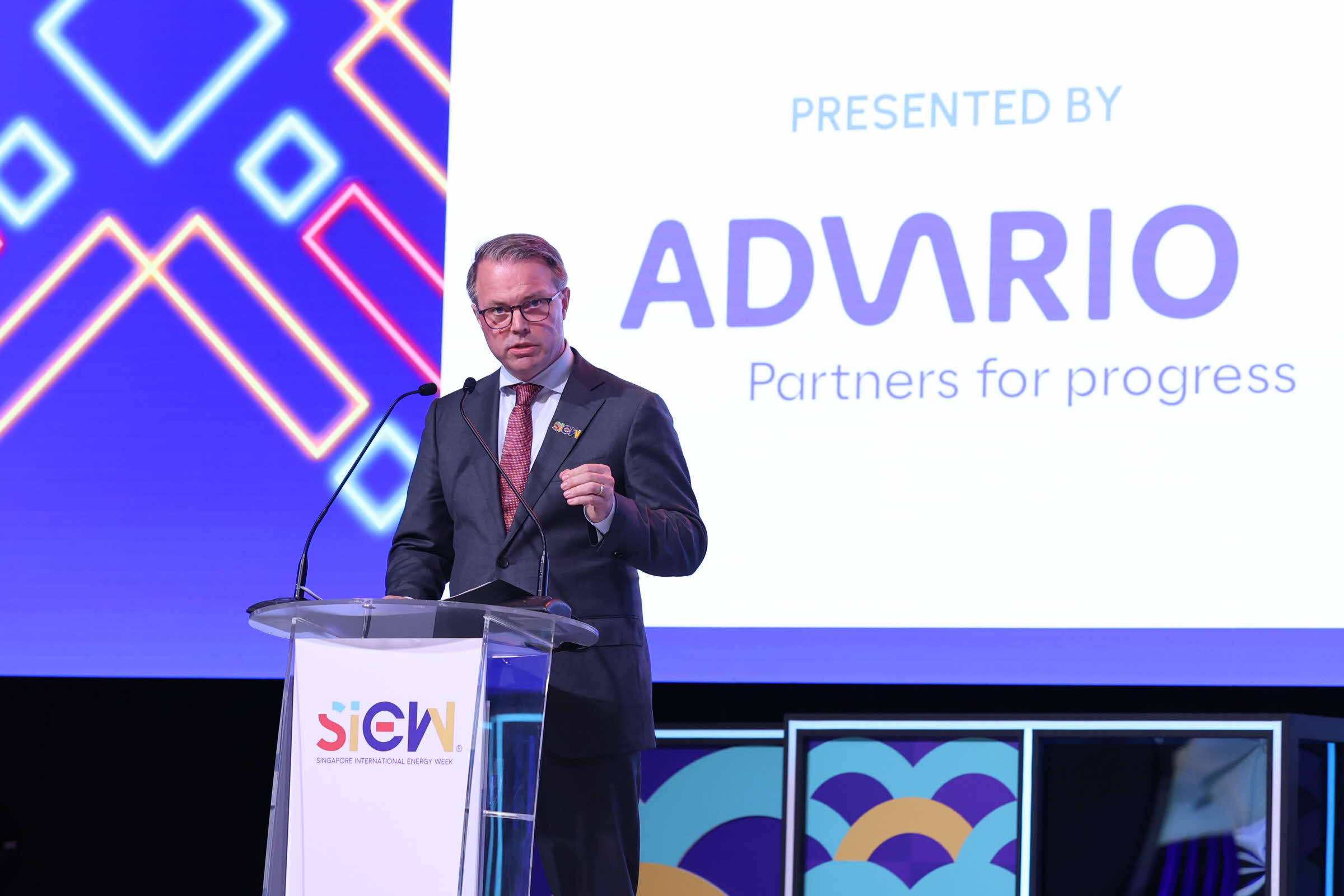
- Despite progress, Mr Verkooijen noted that the speed of the energy transition is not enough to meet rising global energy demands and address the impacts of climate change. He called for technological innovation to make sustainable solutions more affordable and scalable. He stressed the need for a global perspective as climate change transcends borders.
- Mr Verkooijen stressed that the success of the energy transition hinges on strong partnerships across industries, governments, and countries. He advocated for forming "coalitions of the willing" to unite stakeholders with a shared vision. He added that collaboration is the most critical factor in driving real progress and overcoming the challenges of the global energy landscape.
Read more
Stay tuned as the conversation evolves throughout the day. Follow @SIEW_sg on Telegram and Twitter for key insights, as we navigate Day 1 together.
IEA Launches First Regional Cooperation Centre in Singapore to Drive Southeast Asia's Energy Transition
Dr Fatih Birol, Executive Director of the International Energy Agency (IEA), announced the official opening of the agency’s first office outside Paris. The launch, at SIEW 2024, marks a pivotal moment as IEA expands its global reach to accelerate energy transitions in Southeast Asia.
.jpg?sfvrsn=ac1eef79_1)
- Southeast Asia is set to play a leading role in global sustainability. The new IEA Regional Centre will support countries in navigating the region's growing energy demands while shifting towards cleaner technologies.
- Singapore's position as a hub for sustainable financing, innovation, and international energy collaboration makes it the ideal location for the IEA's first regional office. This further cements Singapore's role in global energy discussions.
- The launch of the IEA Regional Centre coincides with the IEA's 50th anniversary, marking its evolution towards clean energy transitions. The new office will serve as a hub for capacity building, policy guidance, and technical assistance, helping countries across Southeast Asia transition to sustainable energy.
- Additionally, in a Special Message at SIEW 2024, Hon. Jennifer M. Granholm, Secretary, US Department of Energy, reaffirmed Southeast Asia's critical role in global sustainability across consumption, production, and manufacturing. She cited regional examples of clean energy collaboration and growth, reinforcing the importance of partnerships in achieving global sustainability goals.
Read more
Stay tuned as the conversation evolves throughout the day. Follow @SIEW_sg on Telegram and Twitter for key insights, as we navigate Day 1 together.
Asia's Energy Transition Requires Pragmatic and Multi-Dimensional Solutions
In a Special Address, Amin Nasser, President and CEO of Aramco, emphasised the importance of region-specific strategies. He advocated for balanced investments in both conventional and renewable energy technologies to drive Asia's energy transition.
- Mr Nasser highlighted that the current global energy transition framework underrepresents the priorities and needs of Asia and the greater Global South. He stressed the need for greater inclusivity.
- The energy transition plan is progressing too slowly, unevenly, and at a cost that is unaffordable for many developing countries. This could hinder their economic and social development.
- Mr Nasser advocated for a pragmatic, multi-dimensional approach that leverages a mix of conventional energy and renewables. He emphasised the need to improve energy efficiency, reduce emissions from conventional sources, and develop new, affordable energy solutions.
- Each country should have the flexibility to choose an energy mix suited to its specific climate goals and economic situation, rather than be bound to a one-size-fits-all global strategy.
- Ensuring an affordable and reliable energy supply is critical alongside sustainability, said Mr Nasser. Without this, there is a risk of reverting to high-emission fuels like coal, which could hinder sustainability efforts.
Read more
Stay tuned as the conversation evolves throughout the day. Follow @SIEW_sg on Telegram and Twitter for key insights, as we navigate Day 1 together.
Sarawak and UN Leader Urge Greater Regional Cooperation as Key to Advancing Asia's Clean Energy Transition
At SIEW 2024, Sarawak's Premier, the Right Honourable Datuk Patinggi Tan Sri (Dr) Abang Haji Abdul Rahman Zohari bin Tun Datuk Abang Haji Openg, and HE Armida Salsiah Alisjahbana, Under-Secretary General of the United Nations and Executive Secretary of the United Nations Economic and Social Commission for Asia and the Pacific, stressed the importance of renewable energy, regional cooperation, and regulatory harmonisation.

- Sarawak has exceeded its 60 percent renewable energy target by 2024. The Malaysian state outlined its pursuit of innovative solutions such as floating solar, pump hydro, energy storage, and biomass power generation to further decarbonise its energy system and position Sarawak as a leader in renewable energy solutions.
- Sarawak plays a key role in supporting Southeast Asia's energy transition by contributing renewable energy to the interconnected Borneo and ASEAN Power Grid. It is actively collaborating with Indonesia, Sabah, Brunei, and Singapore to drive cross-border energy projects that support the region's sustainable energy goals.
- The Malaysian state is positioning itself as a regional energy powerhouse, showcasing how interconnected progress can lead to responsible growth. It is encouraging collaboration and inviting others to join in its journey of innovation and economic transformation towards a cleaner, more sustainable energy future.
- H.E. Alisjahbana stressed the need for actionable strategies and collective efforts to unlock the potential of energy connectivity, particularly in power system integration.
- The ASEAN Power Grid and the Green Power Corridor Framework are key examples of the region's progress in advancing power system connectivity and regulatory harmonisation.
Read more
Stay tuned as the conversation evolves throughout the day. Follow @SIEW_sg on Telegram and Twitter for key insights, as we navigate Day 1 together.
Powering a Low Carbon Future Through Innovation
During the "Low Carbon Technologies Shaping the Energy of Tomorrow" session, industry leaders discussed advancements in low carbon solutions, investment opportunities, policy imperatives and collaboration to achieve a sustainable energy future.
-low.jpg)
- Mr Egon van der Hoeven, Vice President of Business Development, Asia Pacific, ExxonMobil Low Carbon Solutions, highlighted the global challenge of ensuring energy security while reducing emissions, especially amid growing energy demand.
- Mr Jim Gable, Vice President of Innovation and President of Chevron Technology Ventures, pointed to innovation, including carbon capture, as a crucial part of Chevron's efforts to address energy and emissions challenges.
- Mr Geoffrey R. Pyatt, Assistant Secretary, Bureau of Energy Resources, US Department of State, stressed that innovation alone is not sufficient. "We could decarbonise the US economy tomorrow, and that would only solve 11 percent of the problem. We must engage the rest of the world," he said, emphasising that global decarbonisation efforts require international cooperation to make a real impact.
- Dr Jean-Christophe Niel, Director General, Institute for Radiation Protection and Nuclear Safety (IRSN), underscored the need for collaboration in advancing and deploying new low carbon technologies. "The development of new technologies must involve all stakeholders—industry leaders, authorities, policymakers, and technical safety organisations," he said.
Read more
Stay tuned as the conversation evolves throughout the day. Follow @SIEW_sg on Telegram and Twitter for key insights, as we navigate Day 1 together.
Five Success Factors for Accelerating the Energy Transition
K A Habib Noor, EMA
In his Keynote, Mr Miguel Fonseca, Chief Executive Officer, EDP Renewables APAC, outlined five critical factors to speed up the energy transition.
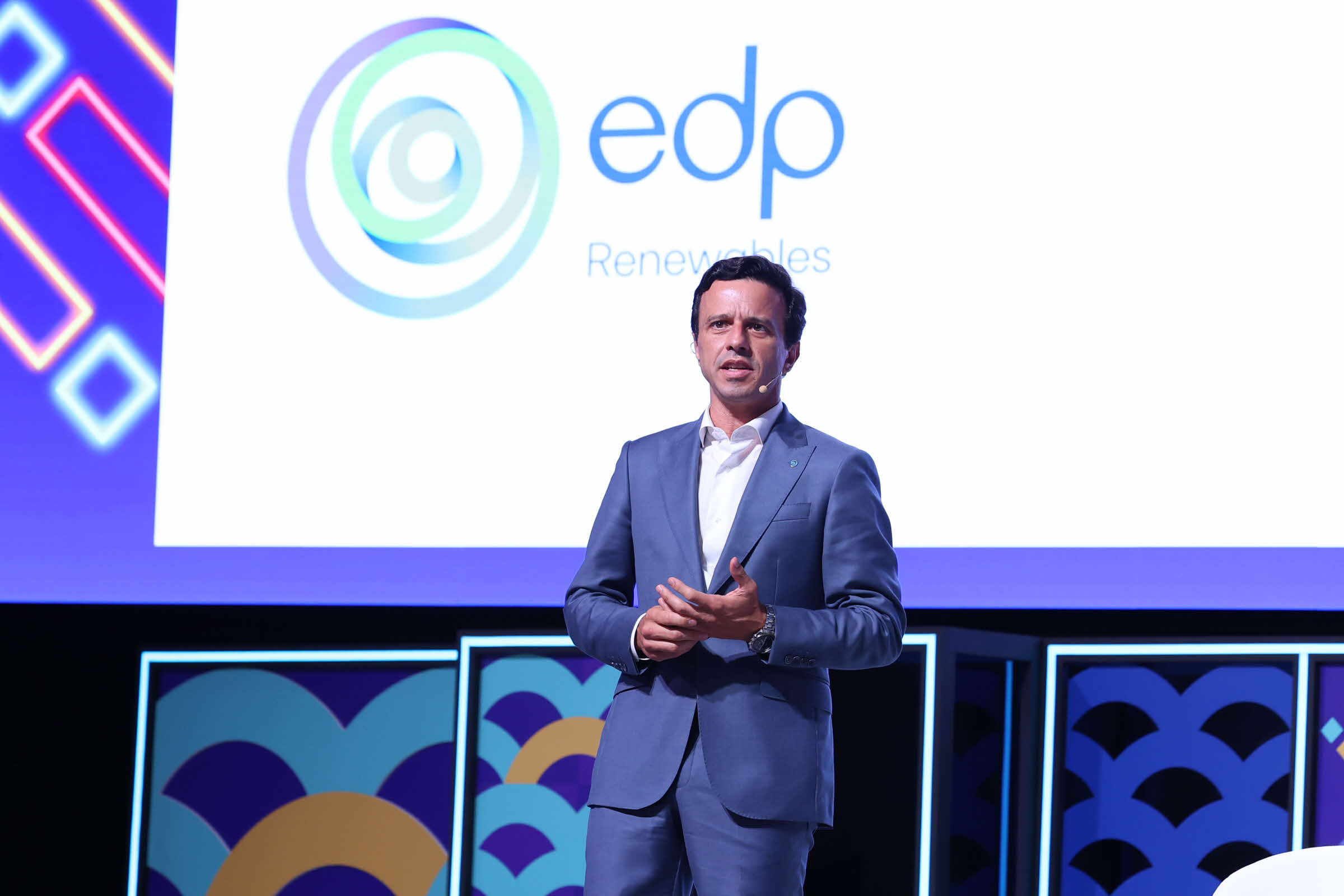
- EDP Renewables, which has committed to achieving net zero by 2040, has identified the five critical factors shaping the energy transition. Mr Fonseca said regulations should be simple, proactive, and designed to align stakeholders effectively.
- Significant underinvestment in the grid remains a challenge. Expanding grid investment is crucial to lowering future energy costs.
- Accelerating bureaucratic processes is essential to bring more clean energy projects to fruition.
- Cross-border grid interconnections will optimise energy demand and improve energy security and resilience.
- Transparency about environmental impacts and early community involvement are key to ensuring public support.
Read more
Stay tuned as the conversation evolves throughout the day. Follow @SIEW_sg on Telegram and Twitter for key insights, as we navigate Day 1 together.
Navigating the Complexities of Sustainable Energy Developments
In keynotes speeches, H.E. Rafael Mariano Grossi, Director General of the International Atomic Energy Agency (IAEA), and Yang Mulia Dato Seri Paduka Awang Haji Mohamad Azmi bin Haji Mohd Hanifah, Deputy Minister of Energy at the Prime Minister’s Office in Brunei Darussalam, discussed the critical opportunities and challenges in the evolving landscape of sustainable energy.
.jpg?sfvrsn=6019ef79_1)
- The Deputy Minister of Energy emphasised the importance of aligning the energy transition with each country's unique economic conditions. In Brunei Darussalam, the energy transition offers a unique opportunity to drive economic growth, benefiting both society and businesses.
- To unlock these opportunities fully, collaboration is essential. Brunei is actively working with Indonesia, Malaysia, and the Philippines to develop a regional power grid. This will enhance interconnectivity in the region. Additionally, he a partnership with Japan is underway to explore the feasibility of hydrogen as a low carbon energy source.
- In a Special Message, Mr Grossi forecasted that global nuclear capacity could increase two-and-a-half times its current size. He emphasised the complementary role of nuclear energy alongside renewable energy sources such as wind and solar, with nuclear energy contributing by-products such as processed heat and clean hydrogen for industrial and transport use.
Read more
Stay tuned as the conversation evolves throughout the day. Follow @SIEW_sg on Telegram and Twitter for key insights, as we navigate Day 1 together.
SIEW 2024 Begins: Welcome!
Today marks the start of the Singapore International Energy Week (SIEW) 2024, bringing together policymakers, industry leaders, and experts under the theme, "A Connected and Sustainable Energy World". This year's agenda promises in-depth discussions and insights on advancing sustainability amid the global energy transition.
The day opens with a Welcome Address from EMA's Chief Executive, Mr Puah Kok Keong, setting the stage for the Singapore Energy Lecture, which will be delivered by Singapore's Deputy Prime Minister and Minister for Trade and Industry, Mr Gan Kim Yong at 9 am.
As the morning unfolds, Dr Fatih Birol, Executive Director of the International Energy Agency (IEA), will officiate the Singapore launch of its IEA Regional Cooperation Centre—a key milestone in fostering collaborative energy efforts across Southeast Asia. Together with Dr Birol will be other high-level speakers including Hon. Dr Doto Mashaka Biteko of Tanzania, H.E. Keo Rottanak of Cambodia, and Hon. Shane Jones of New Zealand. These ministers will explore diverse perspectives on energy resilience and the road ahead.
In a highlight of the morning, Mr Amin Nasser, President and CEO of Aramco, will deliver a Special Address. H.E. Dr Kao Kim Hourn, ASEAN's Secretary-General, will then take the stage at the Singapore Energy Summit, guiding a day of transformative dialogue on a connected and sustainable energy world.
Stay tuned as the conversation evolves throughout the day. Follow @SIEW_sg on Telegram and Twitter for key insights, as we navigate Day 1 together.
SIEW Ministerial Dialogue: Partnerships Key to Accelerating Global Energy Transition
At the SIEW Ministerial Dialogue, energy leaders emphasised the importance of political leadership, cooperation, and financing in advancing the global energy transition. They also stressed the need for inclusivity and regional collaboration to achieve success.
.jpg)
- The Hon. Dr Doto Mashaka Biteko of Tanzania, HE Keo Rottanak of Cambodia, and Hon. Shane Jones of New Zealand emphasised the need for private-sector investment and international partnerships to accelerate large-scale energy infrastructure projects. These efforts are critical to fast-track the energy transition.
- Panellists, during the SIEW Ministerial Dialogue, acknowledged the challenge of balancing energy security, consumer affordability, and environmental goals. The ministers stressed that managing these trade-offs are vital for a smooth energy transition.
- Panellists stressed the importance of public engagement, protecting vulnerable groups, and ensuring transparency around the costs and benefits involved.
- Cross-border energy cooperation, such as the ASEAN Power Grid, can improve energy access and reduce costs. Panellists highlighted how regional interconnectivity enhances resource optimisation and affordability.
- Strong leadership and a long-term vision are essential to driving the energy transition forward. The ministers agreed that political will is crucial to overcoming challenges and unlocking opportunities for a sustainable energy future.
Read more
Stay tuned as the conversation evolves throughout the day. Follow @SIEW_sg on Telegram and Twitter for key insights, as we navigate Day 1 together.
Closer Collaboration and Innovation Crucial for Building a More Connected and Sustainable Energy Future
Strong partnerships and groundbreaking technologies are needed for ASEAN to drive sustainability and resilience in the energy sector.

- H.E. Dr Kao Kim Hourn, Secretary-General for ASEAN, said the ASEAN Power Grid is crucial for enhancing energy resilience, regional integration, and advancing a low carbon future. A significant milestone was achieved with the completion of the first phase of the Lao PDR-Thailand-Malaysia-Singapore Power Integration Project, showcasing the feasibility and benefits of multilateral cross-border collaboration.
- Extensive partnerships with dialogue partners, international organisations have enabled ASEAN to mobilise investments, access technical expertise, and strengthen policy frameworks to drive the region's energy transition.
- Beyond the ASEAN Power Grid, Phase 2 of the ASEAN Plan of Action for Energy Cooperation (APAEC) 2021-2025 has made notable progress. The initiative has achieved 33.3 percent in installed renewable capacity, surpassing its target of 32 percent. ASEAN has further achieved a 24.5 percent reduction in energy intensity from 2005 levels, demonstrating ASEAN's commitment to optimising energy use.
- Phase III, commencing in 2026, will focus on accelerating decarbonisation and promoting a just and inclusive energy transition. Key priorities include expanding energy infrastructure, advancing smart grids, enhancing renewable energy adoption, and exploring carbon capture, utilisation and storage (CCUS).
Read more
Stay tuned as the conversation evolves throughout the day. Follow @SIEW_sg on Telegram and Twitter for key insights, as we navigate Day 1 together.
SIEW 2024 Kicks Off: Connecting Global Efforts for a Sustainable Energy Future
The 17th Singapore International Energy Week opens with a call for stronger cross-border collaboration to tackle growing energy demands while accelerating decarbonisation efforts worldwide.
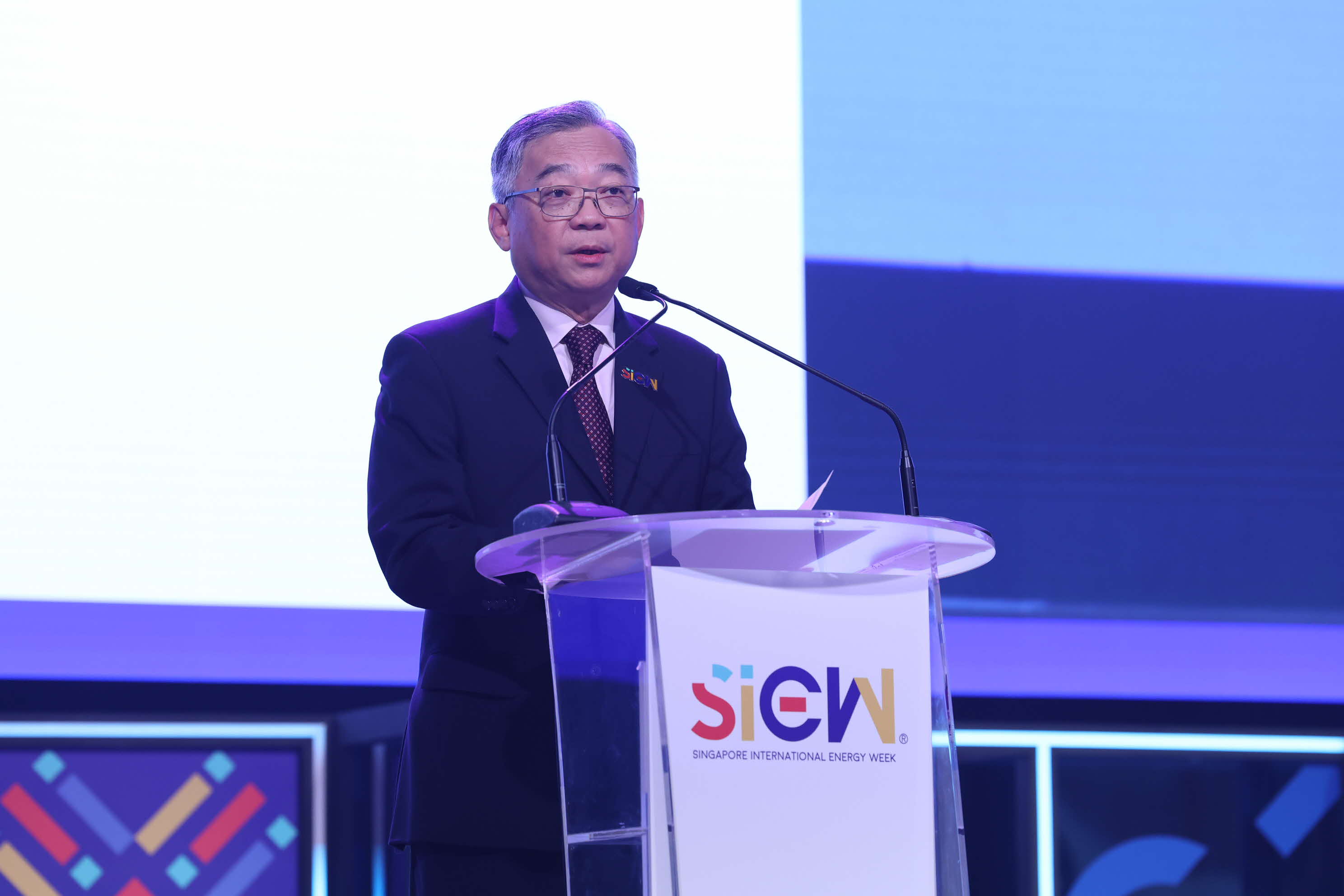
- EMA's Chief Executive Puah Kok Keong, in his Welcome Address, introduced this year's theme, "A Connected and Sustainable Energy World", emphasising global energy collaboration. Deputy Prime Minister and Minister for Trade and Industry, Mr Gan Kim Yong, reaffirmed Singapore's commitment to net zero by 2050, ensuring economic growth balanced with sustainability.
- DPM Gan emphasised the importance of regional energy interconnectivity within ASEAN. Singapore's leadership was highlighted with the launch of the International Energy Agency (IEA) Regional Centre, the first outside Paris, to drive clean energy transitions across Southeast Asia.
- Singapore continues investing in low carbon solutions such as hydrogen and carbon capture, utilisation and storage (CCUS). A grant call for carbon capture and storage (CCS) feasibility studies was announced, advancing Singapore's decarbonisation efforts.
- Singapore is enhancing grid responsiveness and capabilities through the Virtual Power Plant (VPP) pilot and expanding demand response programmes. The Future Grid Capabilities Roadmap, launching later this year, will integrate distributed energy sources, including electric vehicle charging systems. This is to build a more flexible and resilient grid.
- The second Energy Storage R&D grant was awarded to support research into critical energy storage technologies. These technologies are essential for managing renewable energy and strengthening grid stability.
Read more
Stay tuned as the conversation evolves throughout the day. Follow @SIEW_sg on Telegram and Twitter for key insights, as we navigate Day 1 together.